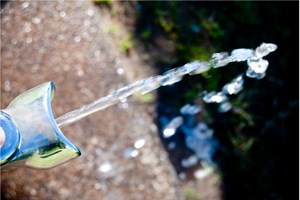Michigan officials roll out Filter First program targeting clean drinking water in schools
(UI) — The Michigan Department of Environment, Great Lakes, and Energy (EGLE) has announced plans to implement new protections against lead in school drinking water under the Filter First legislation passed by the state legislature and signed by Governor Gretchen Whitmer last October.
Filtered water fountain and bottle filling station in a school.
"Every parent wants to make sure their children are safe, and the Filter First bills will protect access to clean drinking water at school,” said Governor Whitmer. “In Michigan, we know how important it is to protect our kids at school. With Filter First, we are taking action so all our kids have access to safe drinking water so they can focus on learning in class. We have also delivered free breakfast and lunch, invested in mental health, and improved school safety. To protect access to safe drinking water across Michigan, we worked together to enforce the strongest lead and copper rule in the country, made record, bipartisan investments to fix our water infrastructure, and helped communities replace thousands of lead service lines.”
Building on the success of Michigan’s strictest-in-the-nation Lead and Copper Rule aimed at eliminating lead in public water supplies, the bipartisan legislation directs $50 million in funding and other resources to support the installation of lead-reducing water stations at schools and childcare centers throughout the state.
Collectively known as Filter First, the Clean Drinking Water Access Act (2023 PA 154) and amendments to the Child Care Organizations Act (1973 PA 116) create the first-of-its-kind legislation specifically designed to protect children from exposure to lead in drinking water in schools and child care centers. The Centers for Disease Control and Prevention states that no safe blood lead level has been identified in children. To promote a child’s healthy development, all exposure to lead should be prevented.
Under the new state legislation, schools must develop a drinking water management plan (DWMP), install lead-reducing filters on all drinking water fixtures, and test filtered water annually. Childcare centers must follow the same protocols and test their water every two years.
Funding administered by EGLE will be available for the one-time acquisition and installation of filtered bottle filling stations, water coolers, point of use faucet filters, and certain maintenance and sampling costs until the funding is exhausted.
EGLE is working with the Michigan Department of Lifelong Education, Advancement, and Potential (MiLEAP) to provide schools and childcare centers with a DWMP template and guidance on filters by April of 2024. This will give schools the necessary time to implement the program before the Filter First legislation goes into effect. Schools and childcare centers are expected to complete DWMPs by Jan. 24, 2025, and have approved filters on all drinking water sources by the end of the 2025-2026 school year.
EGLE this week launched the Filter First webpage containing more information about the program for school and childcare administrators. EGLE and MiLEAP are also planning to host a training webinar on Filter First April 10, 2024, and will post guidance documents and a DWMP template for a 30-day public comment period by April 24, 2024.
The Filter First initiative builds on EGLE’s ongoing commitment to ensuring that children have access to healthy water. Although water entering schools and childcare facilities is required to meet the same federal and state drinking water quality standards as homes, intermittent water use patterns can create more challenges due to water stagnation that could allow contaminants such as bacteria, lead, and copper to get into the water. The EGLE School Drinking Water Program was created to provide guidance and tools for all school and childcare facilities regarding communication, free plumbing assessments, water management plans, sampling plans, sample collection, interpretation of results, risk reduction actions, and water moving programs for school personnel.
Additional information about Michigan’s strictest-in-the-nation lead testing requirements and strategies to reduce lead exposures in the home can be found on the state’s Mi Lead Safe website.
Related News
From Archive

- Glenfarne Alaska LNG targets late-2026 construction start for 807-mile pipeline project
- U.S. water reuse boom to fuel $47 billion in infrastructure spending through 2035
- $2.3 billion approved to construct 236-mile Texas-to-Gulf gas pipeline
- Major water pipe break in Puerto Rico hits over 165,000 customers
- Potomac River Tunnel project enters construction phase beneath Washington, D.C.
- Pennsylvania American Water launches interactive map to identify, replace lead water service lines
- Trump's tariffs drive $33 million cost increase for Cincinnati sewer project
- Utah city launches historic $70 million tunnel project using box jacking under active rail line
- Tulsa residents warned after sewer lines damaged by boring work
- Fatal trench collapse halts sewer construction in Massachusetts; two workers hospitalized




Comments